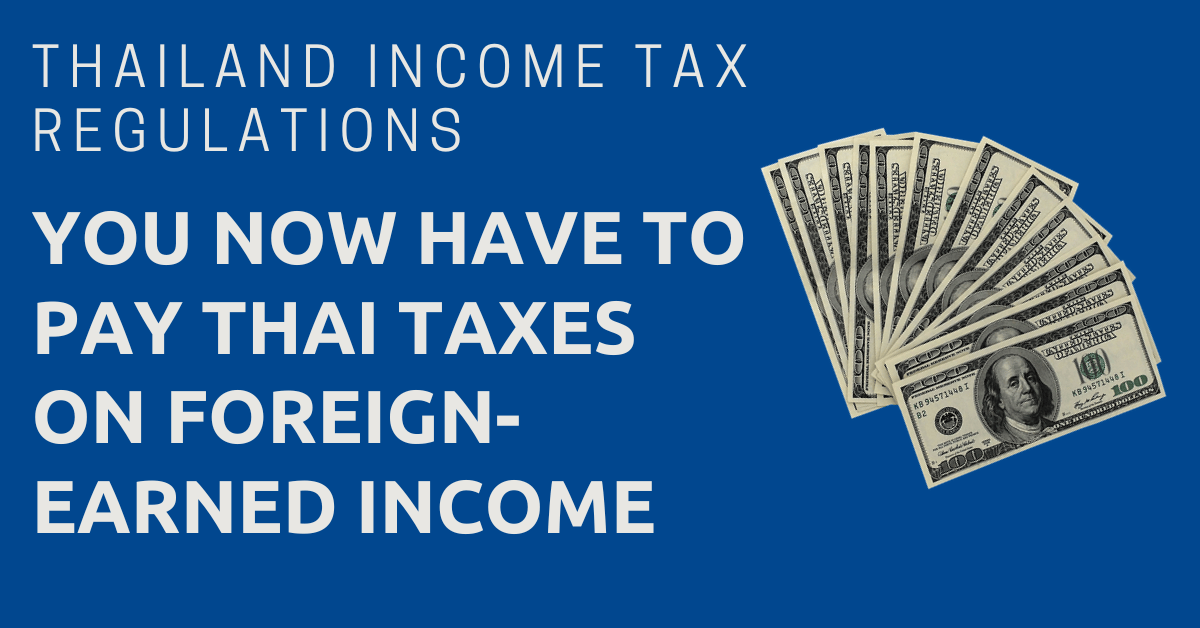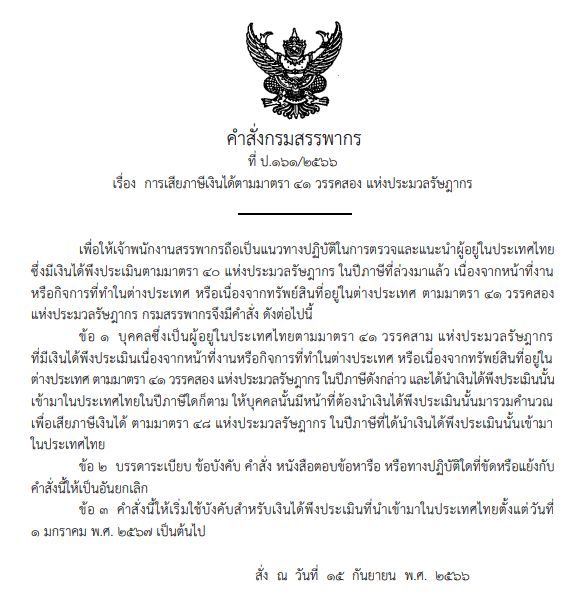
On September 18, 2023, the Thailand Revenue Department announced a new tax regulation on its website:
“Starting January 1, 2024, a Thai tax resident who brings foreign-earned income into Thailand must pay Thailand income tax.”
This is a big change to Thai income tax regulations because expats never had to pay Thai income tax on foreign-earned income if they didn’t bring the money into Thailand after 12 months of earning it.
So, let’s take a look at what changed and how to deal with it.
Note: this article has not been finalized. We will update it as more information is released. In the meantime, you can subscribe to our newsletter to stay informed. Also, we are not tax advisors. If you want to bring foreign-earned income into Thailand in 2024, it’s best to talk to a tax advisor.
"*" indicates required fields
Disclaimer: This article may include links to products or services offered by ExpatDen’s partners, which give us commissions when you click on them. Although this may influence how they appear in the text, we only recommend solutions that we would use in your situation. Read more in our Advertising Disclosure.
Contents
What is the New Regulation?
On Friday, September 15, 2023, an official document from the Revenue Department about the new regulations on foreign-earned income leaked into the public. However, at that time, it hadn’t yet been confirmed if the new regulations would become official.
However, On September 18, 2023, the Revenue Department posted the news on its website regarding Revenue Code Section 40 and Section 41.
This means that for the rest of 2023, if you bring foreign-earned income into Thailand, you don’t have to pay Thailand income taxes on it as long as the money was earned at least 12 months prior.
However, as soon as this new regulation takes effect in 2024, you have to pay Thailand income taxes on all the money you bring into Thailand, in the year in which you transfer it into the country.
Who Needs to Pay Thai Foreign-Earned Income Taxes?
Based on the official statement, the new regulations are mainly for Thai tax residents who bring foreign-earned income into Thailand.

Basically, it’s for everyone, both Thais and non-Thais, who stay in Thailand for more than 180 days a year.
As for the income, it can come from employment, dividends, interest, pensions, capital gains, and so on. It can be simply stated that any income you earned from abroad will be subject to Thai taxation if you bring it into Thailand.
This is for personal income taxes only.
New Announcement on November 22, 2023
On November 22, 2023, the Revenue Department released another publication concerning the foreign-earned income tax. It stated that the new tax regulations would apply only to income earned after January 1, 2024.
This essentially means you can transfer your foreign-earned income to Thailand without having to pay Thai income tax, as long as it was earned before January 1, 2024, and you have evidence of when this income was earned.
Do I Need to Pay?
If you stay in Thailand for more than 180 days and bring foreign-earned income into the country, you may have to pay Thailand income taxes on it.
However, please note that Thailand also has double-taxation agreements with many countries in the world. This means if you already pay taxes for that income in your home country, you may not have to pay taxes on that income in Thailand.
You can find out more about Revenue Code Section 40 and 41 here.
What’s the Cause of This Change?
No one really knows why the Revenue Department released this new regulation. However, since the new regulation was released shortly after Thailand formed its new government, many Thai tax experts believed that the new Thai government would like to promote investment in Thailand.
Previously, many Thai investors preferred to invest abroad because of the higher return on investments. And they were able to transfer the profits from abroad back to Thailand during the next calendar year without having to pay Thailand income taxes.
Starting in 2024, they cannot do this anymore.
However, since the new regulations are mainly for personal income taxes, if people want to invest overseas, they can still invest in Thailand mutual funds that invest in the overseas markets and make profits from dividends and capital gains.
This will, in the end, promote investment within Thailand.
In addition, since the new regulations will begin next year, Thai investors still have time to send money back to Thailand without having to pay taxes until the end of 2023.
How Much Do I Have to Pay?
When the new regulation takes effect, the tax rate you pay will be based on your personal income tax rates, which is a progressive rate of 0 percent to 35 percent.
You can check out our Thailand income tax guide for more information.
Will Pensions be Taxed?
If you retire in Thailand and regularly send your pension here, it’s likely that you may have to pay Thai personal income taxes on that money starting in 2024, if you stay in the country for more than 180 days per year.
However, in case your pension is already taxed in your home country, you might not need to pay Thailand income tax because of the double taxation agreement.
How Do I Declare Foreign-Earned Income Taxes?
We are not sure about this. However, it’s believed that starting in 2024, when you file your personal income taxes in Thailand, there should be an additional field on the tax form about foreign-earned income.
Also, we are not sure how the Revenue Department is going to monitor it as well.
How Do I Handle the Process?
Since the new regulations has started since January 1, 2024.
If you have foreign-earned income and want to avoid paying personal income taxes in the country, you should transfer your money to Thailand and ensure your foreign-earned income was earned before January 1, 2024.
If you want to bring foreign-earned income into Thailand that was already taxed, keep all of your tax paperwork to avoid being taxed twice.
It’s also important to remember that we are not tax advisors. So, please take any advice in this article as just that – advice. If you want to transfer foreign-earned income into Thailand, we recommend you talk with a tax advisor to make sure you follow the new tax regulations correctly.
Looking for more? Don’t forget to check out our premium subscription. It comes with a hundred pieces of exclusive content to help you save money while living in Thailand including How to Amend Your US Taxes from Thailand, How to Handle and Decrease Your Thai Income Taxes While Working in Thailand, How to Buy a Used Condo that’s 30% Cheaper than Market Price, and more.








Help with this please…I can’t find any info for this anywhere. I am a tax resident of Thailand. I have an online brokerage account through Interactive Brokers. I am registered as being a Thai tax resident with Interactive Brokers. I trade some stocks here and there in overseas markets, US, Canada, and Europe. I have an overseas bank that maintains and keeps funds, capital gains from that investing.
Question: If I DO NOT remit those funds into Thailand will they remain tax free? Or because I am trading those stocks myself, and not through say an, account manager who manages that account overseas, with Thailand view that as income derived from within Thailand and tax me as personal income?
So basically, does it matter that I trade the stocks myself in Thailand? As the assets and gains from foreign markets and all assets are outside of Thailand…
Thank you!!!
As for as I know, as long as you don’t remit it to Thailand, you don’t need to pay Thailand tax.
However, please note the tax regulations are subject to change over time. So, it’s better to keep your eyes on it. In addition, we also expect additional clarification from the Thailand Revenue Department regarding this new income tax regulations too since right now there are just too many unclear stuff about it.
I have been saving for over 30 years and have been investing this money oversea. I have paid tax on the interest it has earned, however the savings I have and wish to transfer into Thailand to live on, I am assuming that this cannot be taxed providing it was earned and tax paid in various countries during this time.
If a Dual Tax Agreement is not available for a particular country, what would be the way to proceed.
Based on my understanding, if a dual tax agreement isn’t available for a particular country, you need to pay tax for that when bringing that money to Thailand.
However, please note that the new tax regulations are mainly for income you made after 2024.
Im British, I lived in Thailand and invested in USA shares with a company in Thailand.
I was on holiday in the Philippines when Covid hit.
I’ve now lived in The Philippines from March 2020.
I still have my share account with the Thai company in Thailand.
Do I have to pay tax in Thailand on the profit of my shares?
I think this might discourage investment from expats whose income is sourced from outside Thailand. For example, I’m an Indian who is resident in Thailand, but most of my income comes from Singapore along with my Thai income. Now if I bring that money into Thailand, I get taxed on the upper end of the bracket which incentivizes me to invest it back home as I don’t have to pay any taxes when I bring money back to my country as a non-resident.
Theoretically, I might even be able to bring this money into Thailand next year since I legally have to pay 0% taxes on the current financial year in India due to the double-taxation rule. I wonder what the Thai authorities will say about that, since i’m filing taxes in India too. I guess it’s the same case as residents of UAE and other 0 tax countries.
Initially, the idea of this new regulations mainly targeted Thai citizens who made an investment abroad. And if you pay tax in India, you may not need to pay tax in Thailand because of the double taxation agreements. However, there are so many unclear things about these new regulations at the moment. So, it’s better to wait until everything is clearer.
What about International CC charges? that’s a big nice loophole there
People have been talking about it as well. It’s rumored that the Revenue Department may tax it as well. But so far, no one really knows until we hear more from the RD.
Are their going to be any exemptions for Thai LTR Visa holders whose income does not come from Thailand?
No one knows as of know. It’s better to wait until there’s more official statement from the Revenue Department.
I’m a US citizen living permanently in Thailand. I’m 84 years old and have a yearly retirement visa. My USA Social Security income is over 1,000,000.00 baht per year. I also trade with that money on the NYSE and International Forex market. I file US tax returns every year with a CPA in the US. I’m I liable to report or pay tax in Thailand?
Thank You
Legally speaking, you need to file tax in Thailand even if it’s a pension. However, many retirees in Thailand visit ask this question to their local Revenue Department office. And they receive a similar answer that you don’t need to file tax for pension.
However, this may be changed because of the new tax regulation in 2024. It’s best to wait until there’s a new official statement about it.
Hi, thanx for the great summary. Quick question re income earned overseas that is NOT brought into Thailand…that income is NOT taxed, ie Thailand DOES not and will not be taxing tax residents on their worldwide income?
Just confirming, thank you!
Thailand doesn’t tax your worldwide income. So, if you do not bring it to Thailand, you don’t need to pay tax for it.
I’m living in Thailand. Any money earned world wide will have to be sent to my bank in Thailand to be able to spend it here.
A huge question that is not being answered is what documentation is required to show you have already paid taxes on any money being transferred to Thailand? In the case of a pension do I need 40 years of tax records to prove taxes were paid, in the case of a Roth IRA for example? Even the US government will not require going back more than 7-10 years. If Thailand is saying there is no limit to the year income was earned then they are saying there is no statute of limitations to the amount of time that has passed. Who has records that old?!
This is certainly a great question. As of now, no one knows exactly what type of document the Revenue Department will require to prove that you have already paid taxes on that income in your home country. Hopefully, new guidelines will be released soon.
Once they are released, we will definitely update this article.
You miss the point that income prior to 2024 that was not transferred in the year it was earned is not taxed. So you can safely transfer any savings you have into Thailand and as long as you can prove it was all prior gained to 1 January 2024 you pay no tax.
So the maximum time you need records for is about 3 years, probably less.
Since you refer to a pension and the IRS you need to look at the USA dual taxation agreement as pensions are specifically mentioned (there maybe no tax liability but you must check)
For the Roth IRA it is quite likely to be taxable but again take advice on the details of your situation.
Hello, Thanx for the informative and depressing update. What do you know about the double-tax treaty, between USA & TL? I just signed a lease for next year that will now be difficult to afford with a 25% loss of income.
Thailand has a double taxation agreement with USA. So, if you already pay that income tax to USA, chance is that you won’t need to pay Thailand income tax.
Is your USA Social security going to be taxed they already tacit in the USA”
So if excisable, will we effectively start to pay income tax from 2025 onwards, based on tax returns of 2024? Thank you.
Yes, it should be like that. But please note that if you already pay that income that in your home country, it’s highly possible that you don’t need to pay Thailand income tax because of the double taxation agreement.
So Thailand doesn’t recognize for example social security income from the United States for purposes of a loan to build a home because it is not considered Thai taxable income. If I now have to pay income taxes to Thailand does this income become accepted for purposes of a home loan?
In case it’s a home loan, I believe you don’t need to pay that tax. However, it’s still a good idea to check with the revenue department officer or tax advisor once the law is official next year.
Also, you can look at this Revenue Code Section 40 to find out more about their definition of income: https://www.rd.go.th/english/37749.html#section40
Hi,
Thanks for that informative article.
What do you know about the double-tax treaty, between UK & TL?
How would this treaty add to the article?
Cheers, Tam
Thailand has a double taxation agreement with the UK. In case you already pay tax in the UK, you might not need to pay tax in Thailand.
many people are retired and do not want to do a busines,just retire and relaxe as they are old.thailand is going to make many people go to cambodia,vietnam,phillipines,mexico, costa rica,belize,etc…..
What about disability recipients??
The new regulations should be for disability recipients too. But they have more tax deductions. If I remember correctly, it’s 60,000 baht per year.